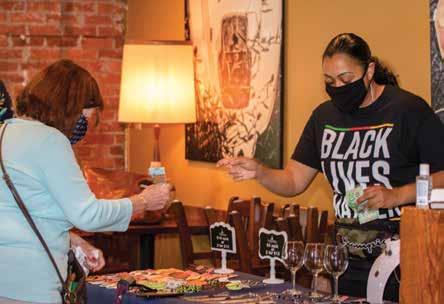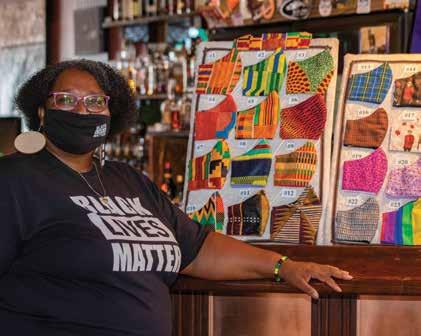
11 minute read
Message from the CEO
ARE WE THERE YET?
At midnight December 31, 2020, there was a collective sigh heard around the world. We hoped that as we crossed into the new year, the heavy burden that we faced during 2020 with COVID-19, and the elevation of violent anti-Black racism would all disappear suddenly. Of course, that didn’t happen. It took time to get here and it will take time to get back to some normalcy. 2021 is special to BBI because it is our 25th Anniversary. A significant milestone of boldness, ambition, strong vision, and strategy for change in business and economic development. We take great pride in the roadmap created by the BBI Task Force and passed on to us to implement in 1996. The five-member Task Force of the BBI, Grace White, Dolly Williams, Joan Jones, Tony Ross, and John Madison were pleased to table the report to the Ministers of the Economic Renewal Agency and the Atlantic Canada Opportunities Agency, dated, August 31, 1995. Sadly, 2020 took Grace White, the Chair of the Task Force, from us. We are still struggling with the very sad news and reflecting on how she would feel now about the initiative she helped to design, develop, and implement. Grace immigrated to Nova Scotia from Jamaica in the early 1970s and attended Saint Mary’s University. Our paths crossed one day while playing tennis at SMU and we became lifelong friends. She was the consummate businesswoman and a true entrepreneur. If you spent time in her company, under her spell, you would always be in awe of her drive, ambition, and work ethic. Our paths would cross at different stages from time to time over the years. She was my insurance consultant, and was very good at it; a no-nonsense businessperson whose counsel and guidance was always helpful. Although she led the Task Force that launched BBI, she demanded excellence and was not easy on us. During the community consultations, she wanted the very best for the Nova Scotian Black community and went to great pains to get it right. She wanted us to be “vibrant and dynamic” in every way. She was a successful and highly accomplished business owner, who won many accolades and awards as one of the foremost Black and female businesspersons in all of Canada. Her company Canjam Trading was a powerhouse fishery and food wholesale business. The recent tension in the South Shore fisheries reminded me of her own challenges dealing with the predominantly white male fishing establishment. They were not ready for a strong Black businesswoman in their midst. I recall her applauding BBI publicly for supporting and “helping” her. I do not think she knew or realized just how good she was. Grace will always be fondly remembered by BBI. I recall, even as she became an extremely sought-after keynote speaker, coach, mentor, and counsel to others, she still always had time for us. The last time she presented at a BBI summit, I had said in my vote of thanks, “I am not sure if I was in a Boardroom or a Cathedral.” She was that good a spiritual soul and that is the memory of her I will cherish forever. So much has happened in 2020. We now know that COVID-19 is a critical health crisis with a catastrophic global economic impact. Every aspect of our lives is impacted by this pandemic and the disproportionate impact on marginalized communities is significantly amplified in Black communities. This was made worse by the devastating and heinous murder of George Floyd. We are still trying to recover, and yes, the recovery will take time. The pandemic will disproportionately affect Black-owned small businesses for two critical reasons: they tend to face underlying issues that make it harder to operate and scale successfully; and they are more likely to be concentrated in industries most immediately affected such as accommodation, food services, personal services, and retail. Here is how you can help: Become a supporter of the Black Opportunity Fund (BOF) whose vision is to combat anti-Black racism in Canada in response to the direct and systemic racism that has faced Black people in Canada since 1629, when six-year-old Olivier Le Jeune was brought to New France as a slave on a British ship. The new federal Black Entrepreneurship Program is a $221-million program designed to enable more Black entrepreneurs and businesses to successfully participate in the Canadian economy. This innovative program will provide the necessary tools, supports, loans and business connections to ensure a better percentage of Black-owned businesses thrive. The BBI is one of the organizations that advocated for this support and hope to play a significant role in the program. To learn more about the Black Opportunity Fund, visit, blackopportunityfund.ca A luta continua.
Respectfully,
S.I. Rustum Southwell BBI, Founding and Interim CEO
By Wanda Taylor Illustrations by Bria Miller Photography by Amanda Carvery Taylor
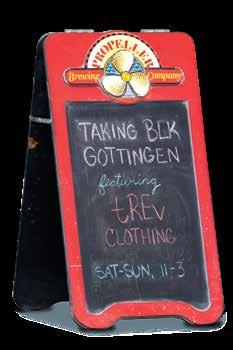

Located in the North End of Halifax, Gottingen Street holds fascinating stories and secrets about its history, its people, and its drastic transformations. This traditional Mi’kmaq Indigenous territory was originally settled by the British military in 1749. As the area evolved and changed, working-class Black and white people became its face and culture. Sections, like the historically Black population that makes up Uniacke Square, prided themselves on community spirit and Black entrepreneurship. As those small Black businesses disappeared and the area eventually became gentrified, its people felt that sense of community slipping away. To add to that, many Black small business owners felt they were being pushed out. But a casual conversation about the old days would lead to Takin’ BLK Gottingen, one of the area’s most successful summer efforts at revitalizing that spirit of community and Black entrepreneurship (NEBA). The faces behind the organization of this initiative are Michelle Strum, Bria Miller, Kordeena Clayton, and Marika Paris. “Takin’ BLK Gottingen was birthed organically and quickly,” artist and business owner Bria said. “I was at Michelle’s [home] in July sitting on her lawn and we were talking about gentrification, how much it has changed Gottingen Street and the North End of Halifax, and how it has pushed out Black businesses and residents who historically lived in the area.” Michelle, owner of Alterego’s, then connected with Kordeena, an artist and the owner of She Nubian Liberation. Kordeena also works in Program Development at the North End Parent Resource Centre. She had existing partnerships with a few dozen Black vendors and had organized some vendors’ markets in the past. She, too, felt many entrepreneurs in the area had suffered as a result of gentrification. “Gottingen Street used to thrive with Black-owned businesses until other people started taking interest in what we created – those vibes that radiated along the street. They wanted to join us. Make it hip, high-end, and urban – to the point that they pushed us out,” Kordeena said. Takin’ BLK Gottingen is a play on words. Kordeena came up with the name as a symbol of the group’s efforts to restore Black


entrepreneurship, its presence, and vitality along Gottingen Street. The summer event would bring Black vendors together with existing predominantly whiteowned establishments in the area. Vendors would receive an allotted time and space to sell their products in these establishments.

Kordeena was in charge of outreach to the Black vendors. Bria was responsible for graphics such as posters and messaging. Michelle was tasked with reaching out to the mainstream establishments on Gottingen Street to see if they would partner by sharing space with the vendors. Instead, Michelle reached out to Marika from the North End Business Association. It was an important move, as Marika mobilized resources such as funding and promotion, and was able to use her established connections within the business community through NEBA. Bria, who talked about how her grandparents used to share stories of their visits to Black-owned clubs and shops along Gottingen Street, said she and Michelle discussed the potential of such an event. “We agreed that it would be incredibly beneficial and powerful to see Gottingen Street reinvigorated by Black business owners. As soon as we said it out loud, we felt something special and got excited.” News of the event quickly spread. Media outlets covered it, and word-of-mouth helped build excitement. Marika received a lot of positive feedback from the businesses in the area willing to partner for the event. She matched business owners with the vendors who held their pop-up shops during the July event. The vendors sold everything from artwork to food to novelties. Some of them were set up in a section of the business, others in the storefront window, and some right outside of the business. By the end of the event, all vendors had sold out – or were close to it. One of the partnerships was a match between Vandal Donuts and
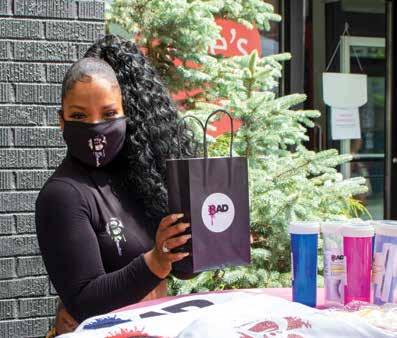
ABOVE: Trevor Silver, owner of TRev Clothing BELOW: Ashley Lorde, owner of Bad Publicity 902
– Bria Miller
Crowd of vendors at Bad Publicity 902’s pop up
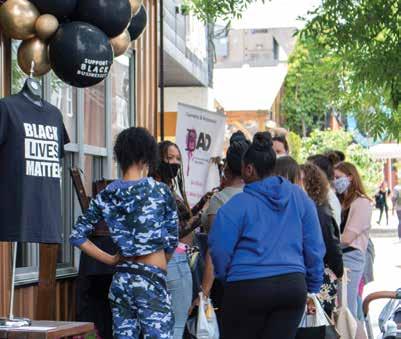
Tanika Bundy, owner of Queens & Kings Naturals vendor Carlette Gray of Carlette’s Pop Up Shop who sold chocolate-covered strawberries. Vandal Donuts decided to infuse some donuts with Carlette’s products, and the creation was a huge hit with customers. The market turned out to be so successful that the women held a second market event in August and a third in September. Each event saw an increase in businesses and vendors all wanting to be involved. That included a request from a business in New Brunswick wanting to get in on the action. Kordeena recalled being shocked but pleased by the event’s positive reach to another province. The market also provided opportunities for increased exposure for artists. The Nova Scotia Art
Gallery reached out to the group to inquire about the visual and print artists for a potential collaboration. With each event, the partnership’s potential increased.
“I had discussions with other businesses, and I have been exploring possible partnerships, like BBI mixers for vendors that could focus on branding and growing social media platforms,” Marika said.
The group was mindful that the events were taking place during a pandemic, so they had to incorporate that reality into their planning.
“We made sure to include COVID information in our promotions. And even before masks were mandated, we included in our marketing that it was mandatory to wear a mask while shopping the market.” Bria said. The group also made sure proper precautions were being taken by businesses to ensure the safety of customers and vendors. Besides the excitement around restoring the vitality of the community, COVID fatigue may have also been a draw for customers. “The feedback that was given to me was how much we needed something like this, how nice it was to be able to go out and support

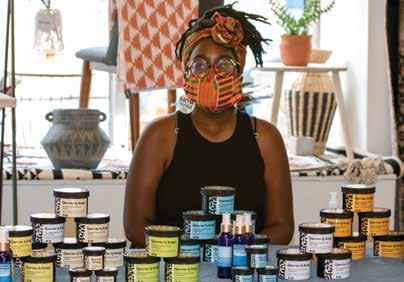
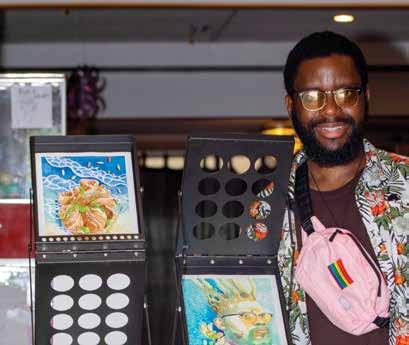
and mingle with everyone. COVID has made it hard on all of us when it comes to in-person interactions, and the market got a lot of people out and within the COVID protocols. It was a safe way to find some sort of normalcy,” Kordeena said. The future looks bright for Takin’ BLK Gottingen. The group is planning a winter market, and have been discussing the possibility of expanding to other communities. They want to keep the market grassroots and continue building partnerships as they grow. Much of their success goes back to the history of Gottingen Street, and the sense of community that may not have been lost after all, but perhaps locked away. Another part of their success is the way they work together as a group. “I have loved working with these women, how organically this all has grown from an idea that really came from intuition and the heart. I’m so excited for what’s to come and excited for us to succeed and support each other.” Bria said. This talented group of women had a vision. They put their skills into action and they realized that vision. The results were more than they had ever imagined. As a team, they brought enthusiasm and excitement to Gottingen Street, opened up opportunities for Black vendors, and capitalized on the resources of businesses eager to jump on board. With these wonderful accomplishments under their belt, there’s no telling what lies in store for these women, and for Takin’ BLK Gottingen.
Sankofa Afrikan Gifts & Marketing
ABOVE: Kiki Mufassa Mononoke, owner of Church BELOW: Bernadette Hamilton, owner of Sankofa Afrikan Gifts & Marketing
